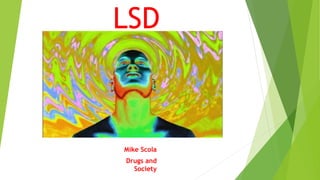
Lsd
- 2. What is LSD? LSD (d-lysergic acid diethylamide) is one of the most potent mood-changing chemicals. It is also a potent hallucinogenic drug. It was discovered in 1938 and is manufactured from lysergic acid, which is found in ergot, a fungus that grows on rye and other grains.
- 3. How is LSD used? LSD is sold in tablets, capsules, and, occasionally, liquid form; thus, it is usually taken orally. LSD is often added to absorbent paper, which is then divided into decorated pieces, each equivalent to one dose. The experiences, often referred to as “trips,” are long; typically, they end after about 12 hours
- 4. LSD/Acid- Experience People who take Acid in high doses experience their emotions in extremes; which can be scary depending on their current life situation during this time period In high enough doses the user can experience extreme distortion of vision/hallucinations The user’s sense of time and self is altered. Experiences may seem to “cross over” different senses, giving the user the feeling of hearing colors and seeing sounds. These changes can be frightening and can cause panic. Some LSD users experience severe, terrifying thoughts and feelings of despair, fear of losing control, or fear of insanity and death while using LSD.
- 5. How Do Hallucinogens Effect the Brain? LSD users can also experience flashbacks, or recurrences of certain aspects of the drug experience. Flashbacks occur without warning, and may do so within a few days or more than a year after LSD use. In some individuals, the flashbacks can persist and cause significant distress or impairment in social or occupational functioning, a condition known as hallucinogen-induced persisting perceptual disorder (HPPD).
- 6. LSD Effects besides the High/Low The effects of LSD depend largely on the amount taken. Causes dilated pupils Can raise body temperature and increase heart rate and blood pressure Can cause profuse sweating, loss of appetite, sleeplessness, dry mouth, and tremors.
- 7. This Quote is Intriguing “There have been no properly controlled research studies on the specific effects of these drugs on the human brain”
- 8. Addiction/Recovery Most users of LSD voluntarily decrease or stop its use over time. LSD is not considered an addictive drug since it does not produce compulsive drug-seeking behavior. People don’t overdose on acid; as you would need an extreme amount. Recovery of “bad trips", Treatment is usually supportive: A quiet room with little sensory stimulation. Occasionally, benzodiazepines are used to control extreme agitation or seizures
- 9. Question How do you feel about the fact that: “There have been no properly controlled research studies on the specific effects of these drugs on the human brain”?
- 10. Resources DrugFacts: Hallucinogens - LSD, Peyote, Psilocybin, and PCP | National Institute on Drug Abuse (NIDA). (n.d.). Retrieved from http://www.drugabuse.gov/publications/drugfacts/hallucinogens-lsd-peyote- psilocybin-pcp